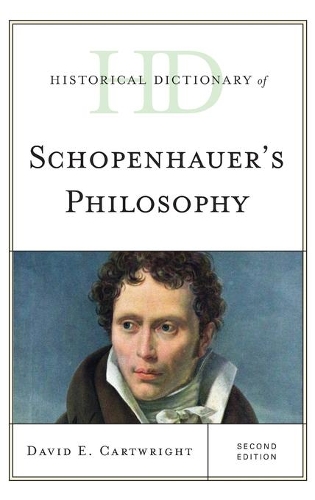
Historical Dictionary of Schopenhauer's Philosophy
(Hardback, Second Edition)
Publishing Details
Historical Dictionary of Schopenhauer's Philosophy
By (Author) David E. Cartwright
Bloomsbury Publishing PLC
Rowman & Littlefield Publishers
20th May 2016
Second Edition
United States
Classifications
General
Non Fiction
193
Physical Properties
Hardback
362
Width 159mm, Height 238mm, Spine 31mm
708g
Description
Arthur Schopenhauer made the momentous decision to become a philosopher when he was approximately 22 years old. Prior to that decision, he had been studying medicine at the university in Gttingen. By that age, however, he had concluded that life was a troublesome affair. So he resolved to spend his life reflecting upon it. Schopenhauer was doggedly determined to persevere in what he considered his mission in life, to reflect on the ever-disquieting puzzle of existence, to ascertain the meaning of living in a world steeped in suffering and death. He was confident that eventually his work would be recognized, a confidence that enabled him to weather laboring in relative philosophical obscurity for some forty years. What initiated the dawn of Schopenhauers fame was a review of his philosophy that appeared in a British journal in 1853, and ever since that time, Schopenhauer drew a readership, one broader than most Western philosophers. He is read not simply and solely by professional philosophers, but also by the wider learned world. Indeed, some have claimed that he is the most widely read Western philosopher. This second edition of Historical Dictionary of Schopenhauer's Philosophy contains a chronology, an introduction, an appendix, and an extensive bibliography. The dictionary section has over 300 cross-referenced entries on all of Schopenhauers books, significant philosophical ideas and concepts, as well as entries covering significant figures in his life and those influenced by this thinking.. This book is an excellent access point for students, researchers, and anyone wanting to know more about Arthur Schopenhauer.
Reviews
This superlative reference resource on one of the 19th century's most influential Western thinkers is fittingly authored by philosopher Cartwright, a scholar, biographer, and translator of Schopenhauer and director of the North American Division of the Schopenhauer Society. Following a brief chronology of events in Schopenhauer's life from 17881860, the author's richly informative 40-page introduction covers the life of the philosopher of pessimism, his philosophy, and his legacy, with helpful summaries of his seminal contributions to the basic domains of epistemology, metaphysics, aesthetics, and ethics. Abounding with cross-references, ranging in length from a single paragraph to several pages, and written with personable fluency, the dictionary entries cover concepts, terminology, themes, and influences pertaining to Schopenhauer's philosophy as well as aspects of his biography bearing upon his thought. The volume concludes with an updated 60-page classified bibliography, organized into original and translated works of Schopenhauer, and a comprehensive, thematically organized listing of Anglophone secondary literature. Given the breadth of Schopenhauer's continuing and growing influence in philosophy, literature, music, and the visual arts, this volume bears a strong claim to be in most academic library collections, replacing the first edition with much new material. Summing Up: Highly recommended. Upper-level undergraduates through researchers/faculty; general readers. * CHOICE *
This exploration of Schopenhauers life and work includes excellent ancillary materials. . . .The primary change is that the second edition provides dozens of new cross-referenced dictionary entries. For students and scholars who work in English with interests in Schopenhauers original texts, a clear benefit of the volume lies in the German vocabulary provided alongside entries referencing specific ideas or titles. Another helpful feature is the use of boldface type within entries to indicate when specific words appear as entries themselves. The dictionary offers as complete a sketch of Schopenhauer as one could reasonably expect, neither shying away from issues such as his misogyny nor ignoring the importance of his pet poodles. * American Reference Books Annual *
Author Bio
David E. Cartwright is a professor in the department of Philosophy and Religious Studies, University of Wisconsin-Whitewater, and he is the Director of the North American Division of the Schopenhauer Society.
